| Srl | Item |
| 1 |
ID:
132970
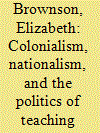

|
|
|
|
|
| Publication |
2014.
|
| Summary/Abstract |
For Palestinian nationalists in Mandate Palestine, British education policy was a source of constant frustration. The shortage of schools, the lack of local control over the curriculum, and the marginalization and de-politicization of Palestinian history constituted major grievances. Proceedings from the Peel Commission reveal much about the rationale behind this policy, particularly the bias toward "rural" education and the attempts to control teachers. Drawing on and complementing the work of A.L. Tibawi, this article seeks to shed light on the nationalists' protests by examining both the responses of officials brought before the Commission, as well as the government's history curriculum during the Mandate. In doing so, the research shows that education policy was constructed to maintain the underdevelopment of Palestine and to hinder state-building efforts that could compete with those of the Zionists.
|
|
|
|
|
|
|
|
|
|
|
|
|
|
|
|
| 2 |
ID:
122793
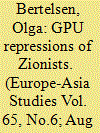

|
|
|
|
|
| Publication |
2013.
|
| Summary/Abstract |
This essay explores repressions against Zionist political parties in Soviet Ukraine in the 1920s, and considers the formation of an efficient synergetic structure of Soviet secret organs in Moscow and Ukraine. The narrative identifies participants from central and regional secret departments who engaged in systematic mass operations against Zionists, and reveals that despite Moscow's initial vacillation between tolerance and persecution of Zionist parties, the Soviet secret police exhibited a continual escalation of repressions against Zionists. The policies of the secret police in Ukraine illuminate their personal adaptation to the coercive Soviet system of centralisation and ideological exclusion.
|
|
|
|
|
|
|
|
|
|
|
|
|
|
|
|
| 3 |
ID:
025312
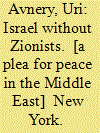

|
|
|
|
|
| Publication |
New York, Macmillan Company, 1968.
|
| Description |
215p.hbk
|
|
|
|
|
|
|
|
|
|
|
|
Copies: C:1/I:0,R:0,Q:0
Circulation
| Accession# | Call# | Current Location | Status | Policy | Location |
| 002911 | 956.94/AVN 002911 | Main | On Shelf | General | |
|
|
|
|
| 4 |
ID:
177931
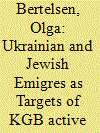

|
|
|
| 5 |
ID:
102731
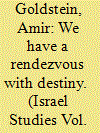

|
|
|
|
|
| Publication |
2011.
|
| Summary/Abstract |
The struggle between the workers' parties and the right-wing Revisionists took an increasingly central place in Zionist history beginning in the 1930s. The Labor Movement gained political hegemony during the period of the Yishuv (pre-state Israel). When Jabotinsky tried to challenge Mapai's power position he suffered a bitter defeat. Most of Israel's first 13 years were marked by political polarity between Mapai and the Herut Movement (the latter led by Begin). Herut received a thrashing in the Knesset elections in 1951 and the General Zionists (GZ) became the second largest party after riding on the wave of middle class protest against the Mapai led government austerity regime. However, it failed to exploit its broad support into a permanent electoral base that would transform the right-center bourgeoisie into a political force that would serve as an alternative to Ben-Gurion's government. In the summer of 1955, Herut replaced the GZ as the second largest Knesset party, and in 1959, Begin became head of the opposition after Herut won 17 seats, twice as many votes garnered by the GZ, which was reduced to its political size of the first Knesset elections in 1949. The key political rivalry returned to the power struggle between the Zionist left and the nationalist right.
|
|
|
|
|
|
|
|
|
|
|
|
|
|
|
|